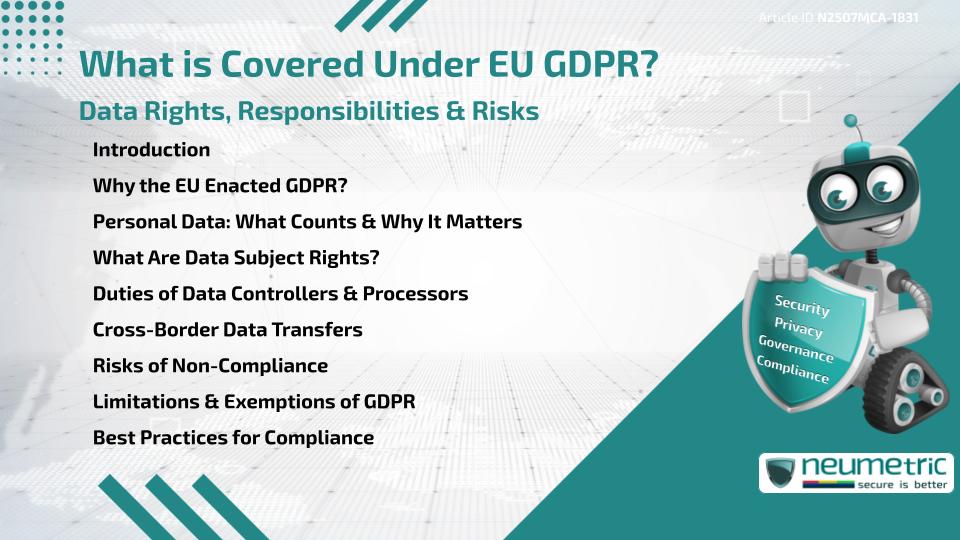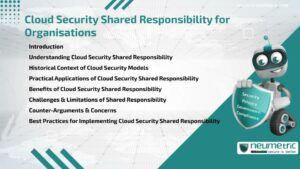Table of Contents
ToggleIntroduction
The General Data Protection Regulation [GDPR] is the European Union’s key legislation for Data Protection & Privacy. Introduced in 2018, it applies to any Organisation that processes the Personal Data of Individuals in the EU, no matter where the Organisation is located. But what is covered under EU GDPR? This question often arises among Businesses, Legal Teams & Privacy Professionals who need clarity on their obligations.
This article explores what is covered under EU GDPR by breaking down the Rights it grants, the Responsibilities it enforces & the Risks associated with Non-Compliance.
Why the EU Enacted GDPR?
To understand what is covered under EU GDPR, it is important to start with why it exists. The GDPR replaced the Data Protection Directive of 1995, modernising outdated rules that could not keep up with Digital Technology. The core goal was to give Individuals more control over their Personal Data while streamlining regulations across all EU Member States.
Personal Data: What Counts & Why It Matters
At the heart of what is covered under EU GDPR is Personal Data. This includes any information that relates to an identifiable person. It can be obvious, like a name or email address or less direct, like IP addresses or biometric data.
Sensitive Personal Data—such as health information, race, religion or sexual orientation—receives even stronger protection under the regulation. If your organisation collects, stores or processes any such data, GDPR applies to you.
What Are Data Subject Rights?
A key aspect of what is covered under EU GDPR is the rights granted to Individuals—known as data subjects. These rights empower people to control how their data is used. They include:
- Right to access: Individuals can request a copy of their Personal Data.
- Right to rectification: Individuals have the ability to update or correct inaccurate or outdated personal information.
- Right to erasure (also known as the ‘right to be forgotten’): Individuals can request the deletion of their data in specific situations.
- Right to restrict processing: Limits can be placed on how data is used.
- Right to data portability: Data can be transferred from one provider to another.
- Right to object: People can object to data processing, especially for direct marketing.
- Rights around automated decision-making: Individuals are protected against harmful decisions made solely by algorithms.
Duties of Data Controllers & Processors
Next in understanding what is covered under EU GDPR is the distinction between Data Controllers & Data Processors.
- A Controller determines the purpose & method of data processing.
- A Processor handles data on behalf of the Controller.
Both parties are accountable for Data Protection. Controllers must ensure processors follow GDPR Principles. Both parties are required to put in place Technical & Organisational safeguards to protect data & prove their Compliance with the regulation. They may also need to appoint a Data Protection Officer [DPO] depending on the scale of Data Processing.
Cross-Border Data Transfers
What is covered under EU GDPR also includes International Data Transfers. If data moves outside the EU, especially to Countries without adequate Privacy Laws, GDPR imposes strict rules.
To Lawfully Transfer Data, Businesses must use mechanisms like:
- Standard Contractual Clauses [SCCs]
- Binding Corporate Rules [BCRs]
- Adequacy decisions from the European Commission
Failure to use valid mechanisms can result in Penalties & Suspension of Data Flows.
Risks of Non-Compliance
No discussion of what is covered under EU GDPR is complete without addressing the Risks. The Regulation enforces steep fines for violations:
- Up to €10 million or 2% of annual turnover for lower-tier breaches
- Up to €20 million or 4% of annual turnover for serious infractions
Beyond Fines, there are Reputational Risks & potential legal actions from Data Subjects. Organisations may also face Operational disruptions due to Audits or Investigations.
Limitations & Exemptions of GDPR
While GDPR is broad in scope, there are limitations & exemptions. For example:
- Data processed for National Security, Journalism or Law enforcement may be exempt.
- Small Enterprises handling minimal Personal Data may have reduced obligations.
- Member States can modify certain provisions through Local Legislation.
Understanding these exceptions is key to correctly interpreting what is covered under EU GDPR.
Best Practices for Compliance
To meet GDPR requirements effectively, organisations should:
- Map & classify all Personal Data they handle.
- Conduct Data Protection Impact Assessments [DPIAs] when needed.
- Maintain a record of data processing activities.
- Implement strong Encryption & Access Controls.
- Train Staff on Privacy Policies & Breach Response Plans.
These Best Practices can make Compliance manageable & help avoid Penalties.
Takeaways
- The answer to what is covered under EU GDPR includes Personal Data, Individual rights, Organisational duties & Risks.
- GDPR applies to all Companies handling EU citizens’ data, even if based outside the EU.
- Knowing your role whether as Controller or Processor is essential.
- Avoiding Compliance can result in large Fines & Reputational damage.
- Proactive measures & Awareness can help maintain Trust & meet Legal Obligations.
FAQ
What is considered Personal Data under GDPR?
Any data that can identify a person directly or indirectly such as Names, IDs, IP addresses or Health records.
Does GDPR apply to Companies outside the EU?
Yes. If a Company offers Goods, Services or Monitors the behaviour of EU Residents, it must comply.
What Rights do Individuals have under GDPR?
Individuals can Access, Correct, Delete or Transfer their data & object to certain processing activities.
What is a Data Protection Impact Assessment?
A DPIA identifies & minimises Risks to data subjects when new data processing activities are introduced.
Can Personal Data be transferred outside the EU?
Yes, but only using authorised mechanisms like SCCs, BCRs or if the destination country has adequate Data Protection Laws.
What happens in case of a Data Breach?
Organisations must notify the relevant supervisory authority within seventy-two (72) hours & inform affected Individuals if the Risk is high.
Are Small Businesses exempt from GDPR?
No, but they may have fewer requirements if they process minimal Personal Data.
Need help?
Neumetric provides organisations the necessary help to achieve their Cybersecurity, Compliance, Governance, Privacy, Certifications & Pentesting goals.
Organisations & Businesses, specifically those which provide SaaS & AI Solutions, usually need a Cybersecurity Partner for meeting & maintaining the ongoing Security & Privacy needs & requirements of their Clients & Customers.
SOC 2, ISO 27001, ISO 42001, NIST, HIPAA, HECVAT, EU GDPR are some of the Frameworks that are served by Fusion – a centralised, automated, AI-enabled SaaS Solution created & managed by Neumetric.
Reach out to us!





